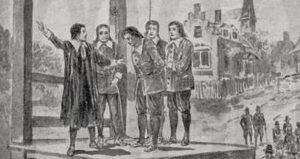
The pious pilgrims divided Plymouth settlers into two groups: “saints” (themselves) and “strangers” (crew and passengers not part of the separatist religious community). John and Ellen Billington and their sons were strangers.
Exploits of the Billington Sons
In December of 1620, while pilgrims still lived aboard the anchored Mayflower, a Billington son caused a fire.
“We, through God’s mercy, escaped a great danger by the foolishness of a boy, one of…Billington’s sons who…had got gunpowder and had shot off a piece or two,” says the Mourt’s Relation account describing how he shot off a fowling piece in his father’s cabin, setting it afire.
Francis Billington climbed atop a tree and reported seeing a great sea. It was a large pond and still bears the name “Billington Sea”.
In 1621, John Jr. wandered 20 miles and ended up in an Indian village. When friendly Indians furnished news of his whereabouts, a shallop with 10 men went to retrieve him. Indians handed him over, “behung with beads”.
A Noose Around John Billington’s Neck
“The first offence since our arrival is that of John Billington who came on board at London and convented before the whole company for his contempt of the captain’s lawful command…” reports Prince’s chronology. Translated: He sassed the captain with foul language. He was sentenced to have his neck and heels tied together. It was his first offense, he begged to be pardoned and was released.
In 1624, Billington joined a conspiracy against Plymouth Colony leadership. Bradford’s 1625 letter to Robert Cushman says: “Billington still rails against you, and threatens to arrest you, I know not wherefore; he is a knave, and so will live and die.”
In 1630, Billington shot off his blunderbuss (gun), killing John Newcomen, with whom he had quarreled. Under the direction of Gov. Winthrop and other leaders, he was arrested, arraigned, tried by jury, found guilty and became the first American hanged for committing murder.
“Writing of Billington, Gov. Bradford said: “He and some of his had been often punished for miscarriages before, being one of the profanest families among them.”
Early Records Name Billingtons
Numerous references to the Billingtons appear in early Plymouth Colony records. They received property in the 1623 land division and livestock in the 1627 division of cattle. In 1636, the widow Billington was found guilty of slander, fined five pounds sterling, and put in the stocks and whipped as punishment.
In 1637, widow Billington (also called Helen and Eleanor) sold off some of her land, deeded the remainder to son Francis and a few months later married Gregory Armstrong.
John Billington Jr. died before his father without leaving children. Francis Billington moved to Middleboro in 1669 and died there in 1684 at age 80. He married Christian Penn Eaton, widow of pilgrim Francis Eaton. At least seven of his children lived to adulthood. In 1642, the court placed four of his children in other families and Francis bound one out as an apprentice.
All known descendants of John Billington are through his son Francis. The latter’s children married into the Beers, Crossman, Eaton, Glass, Martin, May, Patey/Paddy and Sabin families. Well known descendants include U.S. President James Garfield.
